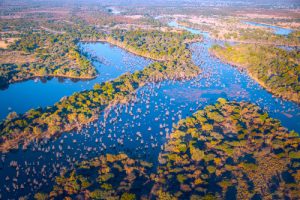
U.S. Sens. Rob Portman (R-OH) and Richard Burr (R-NC) praised the U.S. Senate Foreign Relations Committee’s passage this week of a bipartisan bill to preserve precious southern Africa wetlands by promoting long-term conservation efforts, economic growth and greater stability. The measure now heads to the full Senate for a vote.
“I believe we must confront the threats to wildlife and natural resources around the world, and I’m pleased the committee has passed this legislation to encourage the U.S. to develop a strategy to protect the Okavango River Delta in South Africa,” said Sen. Portman, the bill’s sponsor and a co-chair of the International Conservation Caucus.
The Defending Economic Livelihoods and Threatened Animals (DELTA) Act, S. 3196, which Sen. Portman introduced on July 11, would defend economic livelihoods and threatened animals in southern Africa’s greater Okavango River Basin, according to the text of the bill in the congressional record. Sens. Burr and Tom Udall (D-NM) were among the original cosponsors of S. 3196.
The Senate Foreign Relations Committee also is considering the bipartisan H.R. 4819, introduced on Jan. 18 by U.S. Rep. Jeff Fortenberry (R-NE) and Betty McCollum (D-MN). The U.S. House of Representatives passed H.R. 4819 on July 17 and sent it to the Senate.
“The Okavango Delta is a precious water resource that is home to over one million people and serves as a critical habitat to some of the world’s most endangered species that continue to face a variety of threats from wildlife traffickers, poachers and others,” Sen. Portman said. “I am proud to protect this important resource and the people, wildlife and ecosystems that depend on it, and I urge the Senate to pass this legislation as soon as possible.”
The proposed legislation would encourage the United States to work with the governments of Angola, Botswana, Namibia, and neighboring countries Zambia and Zimbabwe, as well as nongovernmental organizations to expedite transboundary cooperation, improve water and natural resources management, and protect threatened wildlife species that depend on the Okavango River Basin as a critical habitat, according to a summary provided by Sen. Portman’s office.
If enacted, the bill would authorize the U.S. Secretary of State and the administrator of the U.S. Agency for International Development (USAID) to provide technical assistance to the foreign governments and local communities to manage water and natural resources and to build the capacity of local law enforcement, park rangers and community leaders to fight illegal poaching and wildlife trafficking, according to Portman’s summary.
“The Senate Foreign Relations Committee’s approval of the DELTA Act … is another positive step toward building important conservation efforts around the world,” said Sen. Burr, noting that the bill would protect water quality and unique species’ habitats in the Okavango River watershed, thereby “setting an example for responsible conservation both at home and abroad.”
Sen. Udall called the Okavango River Delta “an unspoiled wilderness – a delicate region of deep ecological, cultural and economic importance to surrounding nations and to the world.”
“But today,” he said, “this diverse ecosystem is being threatened by industrial development and wildlife traffickers.”
The bipartisan legislation would leverage key partnerships to help end such practices there, Udall added.
Global conservation organizations also praised the Senate committee’s passage of S. 3196, including David Barron, founder, chairman and president of the International Conservation Caucus Foundation (ICCF), who said, “The United States is once again committing to partner with nations in Africa to support and assist in conserving some of the world’s most iconic species and landscapes.”
Nik Sekhran, chief conservation officer at the World Wildlife Fund, said the DELTA Act is a vote of confidence in the countries of southern Africa to build a prosperous future through conservation.
“These countries have demonstrated vision and leadership through the creation of the Kavango-Zambezi Transfrontier Conservation Area or KAZA, home to half of Africa’s remaining elephants, incredible natural wonders such as Victoria Falls and the Okavango Delta, and some of the most successful community-based conservation programs in the world,” Sekhran explained this week.
Lynn Scarlett, global chief of policy and government affairs for The Nature Conservancy, pointed out that stronger natural resources management in the South African area also benefits America’s national security and economic interests.



